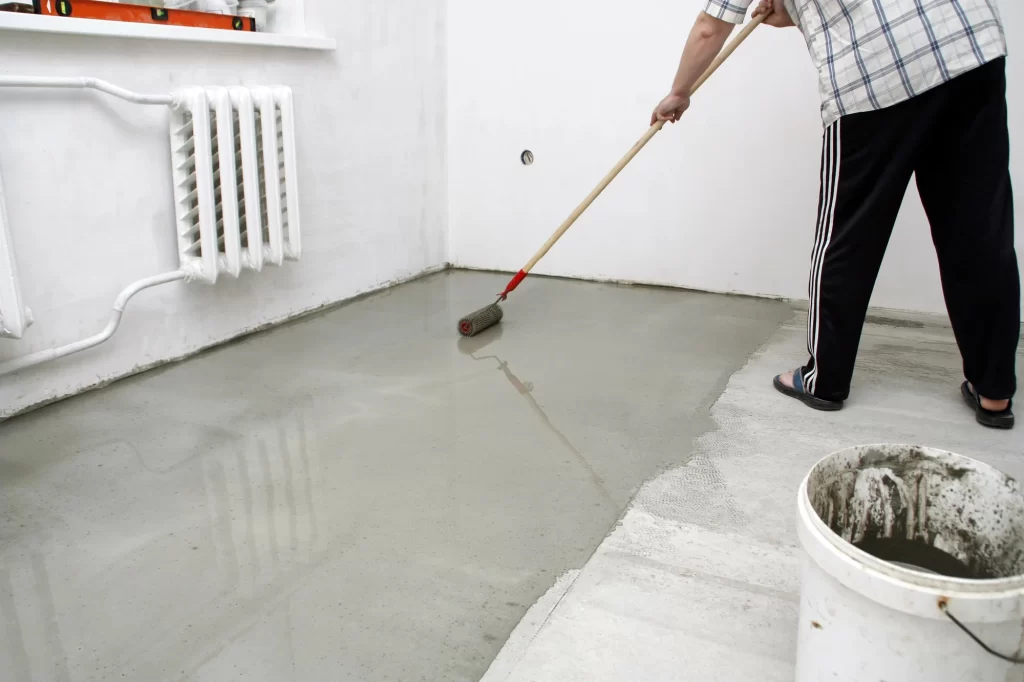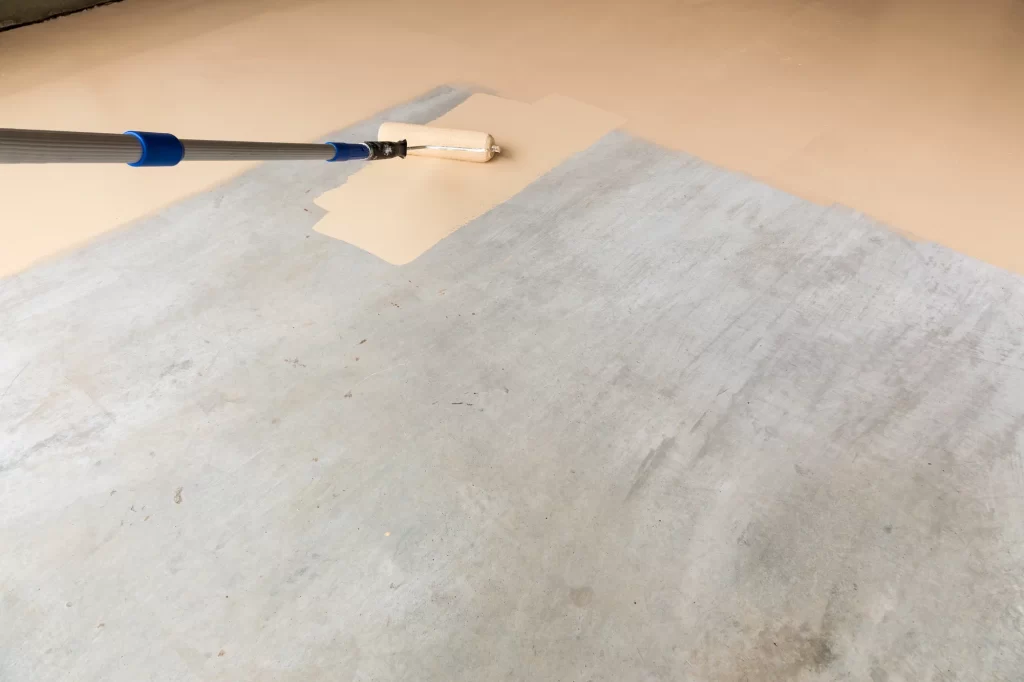Transforming your garage floor can elevate its aesthetics, durability, and functionality. Among the various floor coating options available, epoxy floor coatings, polyurea, and polyaspartic coatings stand out for their durability and resistance to wear and tear. This guide will provide a comprehensive overview of the best garage floor coatings, including their benefits, types, and application processes. If you’re considering a garage floor coating project, read on to discover which coating will best suit your needs and enhance your garage space.

What is Garage Floor Coating?
A garage floor coating is a protective layer applied to a garage floor to enhance its durability, appearance, and resistance to chemicals, abrasions, and other damaging elements. These coatings come in various forms, including epoxy, polyurea, polyaspartic, and urethane, each offering unique benefits. The main purpose of a garage floor coating is to protect the concrete floor from daily wear and tear while also transforming the look of your garage.
Comparative Analysis of Garage Floor Coatings
| Coating Type | Price | Durability | Hardness | Appearance | Stain Resistance | UV Resistance | Application Difficulty | Curing Time | Maintenance |
|---|---|---|---|---|---|---|---|---|---|
| Epoxy | $$ (Moderate) | High | Very High | Glossy, customizable | Good (resistant to oil, etc.) | Poor (yellows over time) | Moderate (surface prep required) | 24-72 hours | Moderate (needs periodic resealing) |
| Polyurea | $$$ (High) | Very High | High | Glossy, clear or pigmented | Excellent | Excellent | Moderate (fast curing) | 1-4 hours | Low (UV stable, minimal upkeep) |
| Polyaspartic | $$$ (High) | Very High | Very High | High gloss, clear or colored | Excellent | Excellent | Moderate (fast curing, requires skill) | 2-6 hours | Low (resistant to UV and chemicals) |
| Urethane | $$ (Moderate) | High | Moderate | High gloss, smooth finish | Excellent | Good | Difficult (multiple layers needed) | 8-12 hours | Low (resistant to stains and chemicals) |
| Concrete Sealer | $ (Low) | Low | Low | Transparent or matte | Poor | Good | Easy (simple application) | 1-4 hours | High (requires frequent resealing) |
| Acrylic Sealer | $ (Low) | Moderate | Low | Matte to semi-gloss finish | Fair | Fair | Easy (DIY-friendly) | 2-4 hours | Moderate (wears off faster than other coatings) |
Why Choose Epoxy for Your Garage Floor?
Epoxy floor coatings are one of the most popular choices for garage floors due to their durability and attractive finish. Epoxy is known for its abrasion resistance, making it suitable for high-traffic areas like garages. Additionally, epoxy coatings provide a long-lasting finish that resists chemicals and stains, making them easy to clean and maintain. When considering an epoxy floor for your garage, it is essential to understand the different types available, such as water-based epoxy and solid epoxy, each offering varying levels of durability and protection.
What is the Best Epoxy Floor for Your Garage?
Selecting the best garage floor epoxy depends on factors such as the garage’s usage, desired appearance, and budget. Solid epoxy coatings provide the highest durability and are best for heavy-duty use, while water-based epoxy is a more cost-effective and easy-to-apply option for DIY enthusiasts. For homeowners looking for an all-in-one solution, epoxy kits are available, which typically include all necessary components, such as a base coat, top coat, and decorative flakes.
Benefits of Polyurea and Polyaspartic Garage Floor Coatings
Polyurea and polyaspartic coatings are gaining popularity due to their fast curing times, UV resistance, and superior chemical resistance. Unlike traditional epoxy coatings, polyurea and polyaspartic coatings offer better flexibility and can withstand extreme temperatures, making them ideal for garages exposed to harsh weather conditions. Additionally, these coatings provide a high-gloss finish that enhances the overall look of the concrete surface.

Epoxy vs. Polyurea: Which is Better?
When comparing epoxy to polyurea, the main differences lie in their chemical resistance, ease of application, and curing times. While epoxy floor coatings provide a durable and affordable solution, polyurea coatings offer faster installation and better resistance to UV rays, preventing yellowing over time. Homeowners looking for a high-performance floor that can withstand extreme conditions may opt for polyurea, while those seeking a more affordable option may choose epoxy.
How to Apply Epoxy Garage Floor Coatings?
Applying an epoxy garage floor coating involves several steps, including surface preparation, application of a base coat, and adding a top coat for additional protection. Proper surface preparation is crucial to ensure the coating adheres well to the concrete floor. This may include concrete grinding and polishing to remove any imperfections. Next, the epoxy application is done using tools like rollers and brushes, ensuring an even finish. A topcoat is then applied to enhance the floor’s durability and appearance.
DIY vs. Professional Garage Floor Coating Application
Choosing between a DIY approach and hiring professionals for your garage floor coating project depends on your skills, budget, and desired results. DIY epoxy kits are readily available and come with detailed instructions for homeowners who want to undertake the project themselves. However, for the highest-end finishes and long-lasting results, hiring a professional with experience in epoxy garage coatings and coating systems is recommended.
Technical Data Comparison for Best Garage Floor Coatings
| Coating Type | Chemical Resistance | Impact Resistance | Flexibility | Temperature Tolerance | VOC Content | Recommended Use | Coverage per Gallon | Average Lifespan |
|---|---|---|---|---|---|---|---|---|
| Epoxy | High | High | Low | 40°F – 120°F | Moderate | Residential, Commercial Garages | 200-300 sq. ft. | 5-10 years |
| Polyurea | Excellent | Very High | Moderate | -30°F – 140°F | Low | Industrial, High Traffic Areas | 250-350 sq. ft. | 10-15 years |
| Polyaspartic | Excellent | Very High | High | -30°F – 140°F | Low | Industrial, Residential Garages | 200-300 sq. ft. | 15-20 years |
| Urethane | Very High | Moderate | Moderate | 20°F – 130°F | High | Decorative Finishes, Top Coating | 300-400 sq. ft. | 5-10 years |
| Concrete Sealer | Low | Low | High | 40°F – 100°F | Low | Basic Protection, Budget-Friendly | 150-250 sq. ft. | 1-3 years |
| Acrylic Sealer | Low | Low | High | 50°F – 100°F | High | Decorative, Low-Traffic Areas | 200-250 sq. ft. | 1-2 years |
Understanding Different Types of Epoxy Coatings
There are various types of epoxy coatings, each suited for different applications:
- Water-Based Epoxy: Easier to apply, lower VOC levels, and better suited for DIY projects.
- Solid Epoxy: Offers the most durability and chemical resistance, ideal for industrial applications.
- 2-Part Epoxy: Requires mixing two components and provides a more robust and long-lasting finish.
Understanding the different coating materials will help you choose the best product for your specific needs.
What is the Cost of Garage Floor Coating?
The cost of a garage floor coating project varies based on the type of coating, garage size, and labor costs. Epoxy coatings tend to be the least expensive option, while polyurea and polyaspartic coatings can be more costly due to their advanced properties and faster curing times. Homeowners should consider their budget and the long-term benefits of each type of coating when making a decision.
How to Maintain Your Garage Floor Coating?
Proper maintenance of your garage floor coating is essential to ensure it lasts for years. For epoxy floors, regular sweeping and mopping can keep the floor clean and prevent wear and tear. Avoid using harsh chemicals that could damage the finish, and consider using a rug or mats to protect high-traffic areas. Spot repairs can be done if needed to maintain the floor’s appearance and functionality.
Frequently Asked Questions About Garage Floor Coatings
- What are the best garage floor coatings on the market?
- How long do epoxy and polyurea coatings last?
- Can I apply a garage floor coating myself, or should I hire a professional?
- What is the difference between water-based epoxy and solid epoxy?
- Are there any UV-resistant garage floor coatings?
Conclusion
When considering a garage floor coating project, it’s crucial to weigh the pros and cons of each type of coating, including epoxy, polyurea, and polyaspartic. While epoxy coatings offer affordability and durability, polyurea and polyaspartic coatings provide superior performance and fast curing times. By understanding the different options and following the proper application and maintenance procedures, homeowners can transform their garage into a functional and aesthetically pleasing space that lasts for years.
When choosing the right garage floor coating, it’s essential to consider factors like durability, appearance, and ease of application. Whether you opt for garage floor paint, a concrete garage floor coating, or a coating kit with decorative floor tiles, your floor will look fantastic with the right choice. For a home garage project, consider a full broadcast finish for a sleek and smooth surface or opt for anti-skid options to ensure safety.
If you’re a diyer, there are floor coating kits that are easy to apply, but remember, proper preparation is required for the best results. Whether you want a low VOC option or professional-grade durability, we provide you with the best solutions for your improvement project.
For expert guidance and to explore our types of floor coatings, contact us at Prairie Land Garages Inc. at (773) 679-7833 or email us at info@prairielandgarages.com. Our team is here to help you transform your concrete garage floor into a highly durable and attractive surface. Visit our gallery for inspiration!
Key Takeaways:
- Epoxy floor coatings offer durability and are cost-effective for DIY projects.
- Polyurea and polyaspartic coatings provide superior UV and chemical resistance.
- Proper surface preparation and regular maintenance are essential for longevity.
- Consider your specific needs and budget when choosing the best garage floor coating.
By exploring the various options available, you can find the perfect solution to enhance your floors and provide a durable and attractive finish for your garage.
